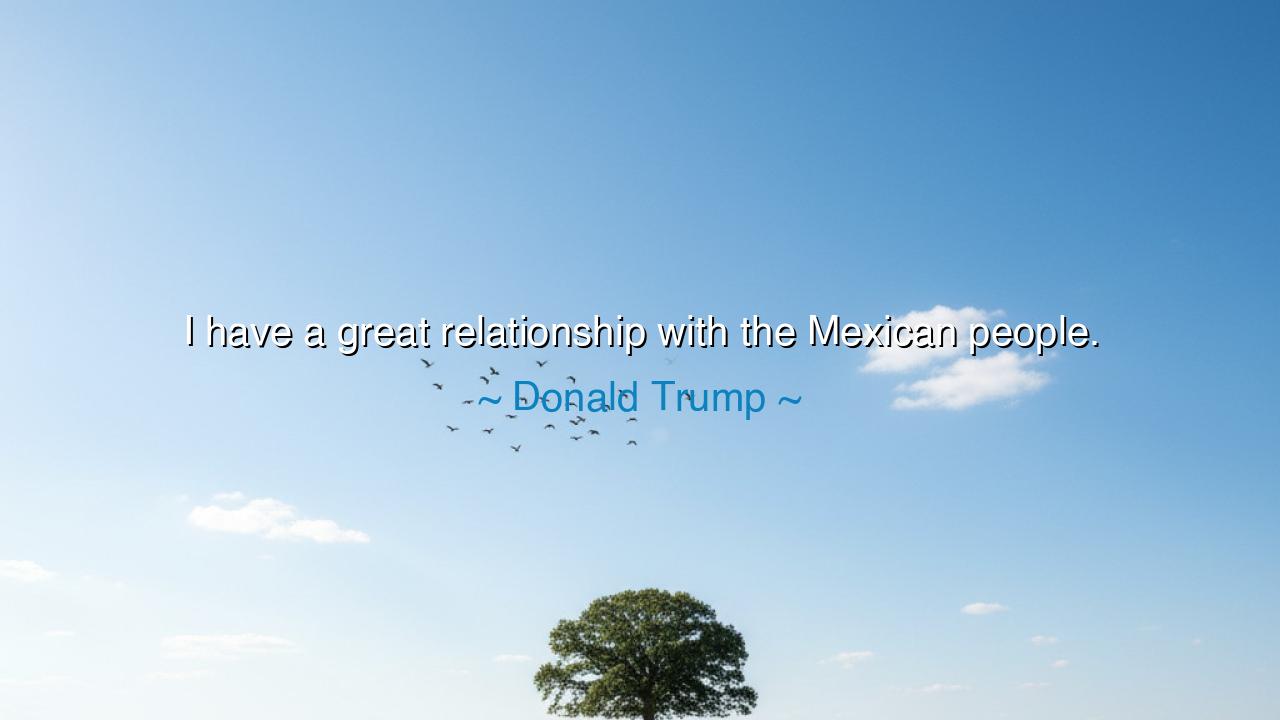
I have a great relationship with the Mexican people.






When Donald Trump said, “I have a great relationship with the Mexican people,” his words, though brief, carried layers of meaning, politics, and paradox. On the surface, the phrase may seem simple — an affirmation of goodwill between a leader and a nation’s people. Yet beneath its simplicity lies a reflection of one of the oldest struggles in human affairs: the tension between power and perception, between what is spoken and what is felt, between the desire for unity and the legacy of division. To the wise ear, this quote invites not cynicism, but contemplation — for it touches upon the fragile thread that binds nations, and indeed, all peoples: the thread of understanding.
The origin of this statement comes from a time of turbulence and controversy, when Trump, then a political figure rising to prominence, had made remarks about immigration that divided public opinion. His words about having a “great relationship” with Mexicans were spoken in defense — a gesture meant to bridge what had been broken by rhetoric. Yet, even in this, there lies a universal truth: that human beings, when confronted with conflict, often reach for reconciliation, even if imperfectly. The ancient philosophers would say that such moments reveal the dual nature of man — capable of division, yet yearning for peace; capable of pride, yet desiring harmony.
In this light, the statement becomes less about politics and more about the eternal pursuit of connection. For throughout history, leaders have sought to heal rifts between peoples, to turn enmity into alliance. We might remember Abraham Lincoln, who, even in the darkest days of the Civil War, spoke of “malice toward none” and “charity for all.” His words, like Trump’s, sought to affirm relationship where hostility had taken root. Whether from a place of sincerity or necessity, the act of reaching across division has always been the beginning of progress. A bridge built, even out of damaged wood, still holds the promise of passage.
But there is also a deeper lesson about the power of language. Words can wound, yet they can also heal. To say, “I have a great relationship with the Mexican people,” is to invoke the ideal of unity, even when reality falls short. The ancients believed that words shape the world as surely as hands build cities. In the Greek tradition, logos — the word — was both speech and creation, both reason and light. Thus, every public declaration carries the seed of potential: the power to divide or to mend, to mislead or to inspire. Trump’s statement, viewed through this lens, becomes not a mere defense of image, but a mirror held up to all who wield words — a reminder that leadership demands harmony between speech and action.
Consider, too, the story of Alexander the Great, who, after conquering Persia, chose to marry the Persian princess Roxana and adopt many customs of the people he had once fought. His generals balked at the act, yet Alexander understood that empire cannot be sustained by domination alone; it requires respect for those one claims to lead. So too, in modern times, the relationship between nations depends not only on treaties or trade, but on the recognition of shared humanity. The Mexican people, like all peoples, are not abstractions but individuals — rich in history, dignity, and culture. To say one has a “great relationship” with them, therefore, carries a sacred responsibility: to uphold that relationship in truth, not merely in words.
In the ancient world, the wisest rulers were those who knew that greatness does not come from conquest, but from connection. When a king or leader could see beyond the borders of tribe and nation, he became more than a ruler — he became a steward of peace. Trump’s statement, stripped of its political trappings, touches upon that timeless ideal. It reminds us that to lead — whether a nation, a family, or a community — is to strive for relationship, to extend the hand of understanding even when mistrust runs deep. The strength of a people lies not in their walls, but in their ability to build bridges.
So, my listener, let this teaching sink into your heart: relationships are the foundation of all greatness. Whether between individuals or nations, they must be nurtured with honesty, empathy, and effort. It is not enough to claim harmony; one must live it. Seek to understand before you are understood. Speak words that uplift rather than divide. And when conflict arises — as it always does — do not retreat behind pride, but reach forward with humility.
For in the end, the worth of a person, and indeed of a civilization, is measured not by what it conquers, but by what it connects. As the ancients would say, peace is not a passive state but an active labor — the art of building harmony, one word and one act at a time. So when you speak of your “great relationship” with others — whether a neighbor or a nation — let it be not a boast, but a promise: a promise to live in respect, to seek truth, and to keep building bridges long after the noise of the world has faded into silence.






AAdministratorAdministrator
Welcome, honored guests. Please leave a comment, we will respond soon